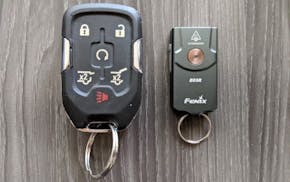Q: I hope you can help us find out what is causing a loud whining on our 2013 Toyota RAV4. It started a month ago at 9,500 miles and is getting louder. The noise starts at about 55 mph and winds down when we slow down. Three Toyota mechanics drove it and none know what it is.
A: A quick Internet search turned up a number of posts dealing with a whining noise from newer RAV4s. Many point to a transmission issue, others to a problem with the rear differential. Many express difficulty in having the noise confirmed by the dealer and repaired. My ALLDATA automotive database pulled up service bulletins covering 2006-2012 RAV4s dealing with a whining noise corrected by replacing the engine insulators/mounts. I also found a bulletin suggesting a "growl" sound caused by contamination of the front bearing in the rear differential coupler.
You might be able to help the dealership pinpoint the origins of the whine with a few simple tests. While the whine is occurring at 55-plus mph, release the throttle so the car begins to slow. As the whine starts to "wind down," shift the transmission into neutral. Does uncoupling the driveline from the wheels change the noise? If so, it's a driveline whine — engine, transmission or differentials.
If not, re-engage the transmission into "D," accelerate back up to road speed where you are hearing the whine, then safely change lanes and back, turning to the left and right. Does turning in either direction change the noise? If so, wheel bearing/hub assemblies are suspect.
If neither of these tests helps, rotate the tires/wheels front to back and retest. If there's a change in noise, it's likely an issue with the tires.
And finally, maintain contact with the dealer asking him and Toyota to continue to investigate this issue.
Q: I have a 2003 Buick that I have to have jump started regularly. I have installed a new battery every year but it does not hold its charge. I've been told to start the car every three to four days but even this doesn't seem to help. What can I do to keep the battery charged?
A: You've installed 10 new batteries in this car? If so, that's a record! Basically you have three choices: Disconnect the battery while the vehicle is parked, connect a trickle charger or battery maintainer while the vehicle is parked, or find the cause of the battery drain that is discharging the battery. The first two options aren't particularly satisfactory or convenient although they will prevent a dead battery.
I'd suggest having a shop perform a parasitic drain test. Connecting an ammeter or test light between the battery cable and battery with the ignition off will monitor the flow of electricity and identify any excess current flow. Normal would be less than 150 milliamps, which is 1.5 tenths of an ampere. Then, with the meter still connected, remove each fuse and relay one at a time to find the circuit with the excess current draw.
A typical cause for discharging a battery to where the vehicle won't start in roughly three days is a stuck relay or perhaps a small light bulb such as a trunk or glove box light.
Q: How mechanically safe is it to drive using cruise control at 25-35 mph? A friend uses cruise control on streets so she doesn't speed. Does this hurt the car?
A: I don't think so. Most cruise systems are designed to not engage below a certain speed, typically the 25-30 mph range. But if the system will engage, it won't cause any damage to the vehicle. Personally, I'd be more concerned that with one less thing to monitor and maintain, there would be more opportunity for distraction while driving.

Motormouth: Oil type not an issue



